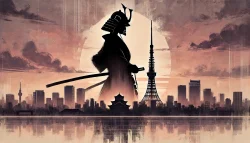
October 14, 2010
All Smiles
Globetrotting director Atsushi Ogata tries his hand at a romantic comedy... in a country where there are no romantic comedies
By Metropolis
Originally published on metropolis.co.jp on October 2010

Photo by Sarah Cortina
Picture this: you enter a grocery store only to have an old woman tap you on the shoulder wanting to know how long the sale is on. While waiting for your friend in a theater lobby, fellow patrons keep coming over to ask where the restroom is. A bit later, you’re mistaken for an attendant and asked to escort a lost child. As you try to help the girl look for her parents, the grandmother confuses you with a kidnapper she’s seen in the paper and calls the police.
This chameleon-like ability to blend into one’s surroundings is the sort of quality that critics rave about in actors; in real life, though, it might get a bit old. But that pretty much sums up the life of Hiroshi, the main character in director Atsushi Ogata’s debut feature Wakiyaku Monogatari—and also, to a certain extent, that of his creator.
While Ogata has never actually been arrested for kidnapping, he says that Hiroshi’s other experiences are all too familiar. “I go to an office for a meeting, and somebody drags me to another room and is like, ‘The Xerox machine is over here.’”
And then there was that little incident on the Swiss-Austrian border. “I was at a filling station and about to get back in the car when this German guy comes up and asks me, ‘Do you work here?’ And I said, ‘Nein.’ But he was convinced that I did and he wanted me to fix his rearview mirror. I somehow got into his car, but I didn’t want him to kidnap me or anything. So I sort of sat so I could kick the door open if I had to, and I’m trying to fix his mirror, but of course I can’t. And my father’s looking over like, ‘What the hell is he doing in somebody else’s car?’”
At this point in our interview, we begin to realize that speaking with Ogata is not unlike running a marathon—after it’s all over, it’s hard to tell whether you’re more exhilarated or exhausted. “You’ve only got 30 minutes?” a mutual friend asked incredulously when we said we’d be speaking with the director. “That’s not going to be long enough. He talks a lot.”
Even in English?

© 2010 Dream On Productions
“Oh, he talks even faster in English.”
With its wacky cast of characters—from an amorous policewoman to a handsome-yet-dim action star—and frequent cases of mistaken identity, Wakiyaku Monogatari (English title: Cast Me If You Can) plays like a classic Hollywood screwball comedy. Hiroshi (Toru Masuoka, Always 3-Chome no Yuuhi) is a middling actor constantly relegated to playing wakiyaku, or supporting roles. Until one day when he meets Aya (Hiromi Nagasaku, Hito no Sex wo Warau na), an up-and-coming actress who actually recognizes him. As the two grow closer, Hiroshi is inspired to become a true leading man, both on screen and in his own life.
It turns out that this story perfectly suits Ogata’s background and temperament. In person, the director comes across like some kind of Woody Allen-Jerry Seinfeld hybrid, a lanky Japanese man with wiry hair, a vaguely New York accent and the kind of manic energy that causes people to become things like film directors. His intellectual restlessness has taken him from Japan to the US, Germany and Holland while experimenting with careers from acting to video art and a fateful stint as a “scoreboard man” on a TV game show.
Growing up in Tokyo and New York, Ogata says he was a clumsy kid who tended to play hooky when there was an arts-related activity at school. But that all changed the day he received his first camera. “Suddenly, I could do anything,” he says. “It was like a natural brush for me.” He used his family’s lavatory as a darkroom and soon progressed to shooting on Super 8. Although continuing his artistic studies at Harvard University, he says he still never considered film as a career. “I graduated from school, came back to Japan and worked in a computer company—as was sort of expected—but I didn’t really like it,” he says with a shrug.

© 2010 Dream On Productions
When a graphic designer friend complimented his photography, Ogata was inspired to pursue it further. He enrolled in an art and technology program at MIT and received a research assistantship working on man-machine interfaces. “But when I got there, I spent all my time making color photographs and art videos,” he recalls. “So I almost got kicked out of school and had to switch departments. I canceled my research assistantship because I thought there was no point in coming all the way to MIT to graduate school and just working like I could in Kawasaki.”
Ogata’s big break came in Holland, where he had gone to try his hand at writing screenplays—and where he served as the “fake scorekeeper” on a TV game show. That appearance led to a role in a student movie. “They thought I was really funny, so I managed to get [that crew] to help me with my first short film,” he says. “We had free film stock that was left over from Ocean’s 12. And then the director of photography’s friend—he’s actually one of the best focus pullers in Holland—he wanted to be a producer and he got all his friends to come in. So we had free steadicams, the best steadicam operator in Holland.”
Ogata’s early screenplays ranged from big-budget action flicks to cast-of-oddballs ensemble pieces. “But I ended up basically discovering that I need to focus on comedy,” he says. “Because I tried other genres—I tried to write a thriller, I tried to write a tragedy, and it just all turns comical.” His debut on the international stage came with the Japanese-language short Eternally Yours (2006), which he calls a “battle of wits between an elderly lady and a conman.” The film was selected for MoMA and Lincoln Center’s New Directors/New Films Festival, as well as festivals in California, Bangkok and Berlin.

© 2010 Dream On Productions
Sitting with the director, it’s easy to see that humor comes naturally. Even when he’s not consciously being funny, Ogata’s words come out in a flood, peppered with self-deprecating one-liners. “I’m not even trying to make people laugh, I just tell them what a bad day I had and they’re cracking up instead of saying ‘Oh, what a poor guy, sorry,’” he says.
Yet Ogata realizes that focusing on comedy is a risky move for a Japanese director—of the Japanese films that have garnered critical or commercial success overseas, very few have been comedies. The frequently heard assertion is that Japanese humor is just “different.”
Another solution, Ogata says, is to pursue themes that are “universal.” “[Eternally Yours] had people laughing in San Paolo, people laughing in California, New York, Bangkok—because old ladies and con men exist everywhere.” So with his first feature, the director wanted to take that sensibility even further, and a romantic comedy seemed like the natural thing to do.
Another problem, he soon discovered, was that the idea of the “romantic comedy” doesn’t exist in Japan. “When you say ‘comedy’ in Japan, people think of owarai geinin. And if you say ‘romance,’ it’s another kind of thing. So the publicity department is having a difficult time,” he adds with a laugh.

© 2010 Dream On Productions
But Ogata’s unconventional (for Japan) ideas don’t end there. Screenings of Wakiyaku Monogatari at the Human Trust Cinema in Yurakucho will have English subtitles—a rare occurrence even in a city with a relatively large foreign population. “It’s a chance for people who are not native Japanese speakers to be able to just go to the cinema and enjoy a Japanese film with a Western romantic sensibility, and just laugh together with a Japanese audience,” he says. “I mean, how often does this happen? And they can just go to the nearby cinema and do this. And that’s really exciting.”
With the release of Wakiyaku just around the corner, Ogata has gone into full-on public relations mode. “I’ve been going to parties a lot and telling people about the film,” he explains. “They say ‘Oh yes, I’ll definitely come!’ So I pull these out and say, ‘Well, I have some tickets right here, do you want to buy one?’ The first time, I sold 12 tickets in 20 minutes. People ask, ‘What are you doing? You’re the director!’ I just think, ‘Well why not?’”
Wakiyaku Monogatari opens October 23. Screenings with English subtitles at Human Trust Cinema Yurakucho: 2-7-1 Yurakucho, Chiyoda-ku. Tel: 03-6259-8608. Nearest stn: Yurakucho, Ginza exit. http://meturl.com/human ● www.wakiyakuthemovie.com (J/E)







